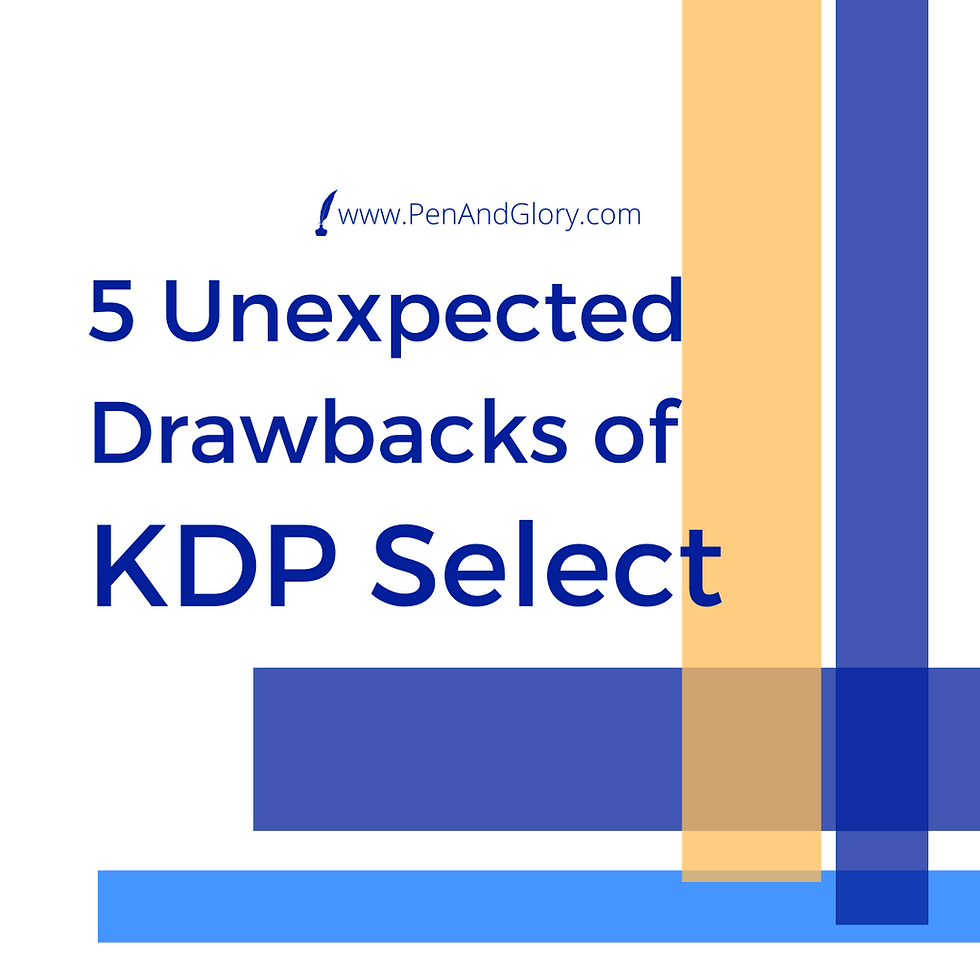5 Unexpected Drawbacks of KDP Select
- Amanda Clemmer
- Apr 29, 2021
- 5 min read

Note: Earlier I wrote a post about why Kindle Select might have some often-overlooked benefits. In this follow-up, I'll review my own decision not to stick to Kindle Select and some of the problems I encountered.
KDP Select (or Kindle Unlimited, on the readers’ end) is a comparatively new way to publish and get paid. You enroll your book through your KDP dashboard, and your writing is entered into a subscription-based database. Readers on Kindle Unlimited have access to your books for free and you get paid according to how many pages are read.
Does that sound enticing?
I decided to give KDP Select a try via a pen name and see how well it worked out. My alter-ego focuses on paranormal young adult stories--vampires, werewolves, you name it. I keep the stories simple, short and fairly formulaic so I can publish on a regular schedule and try to monitor the market.
While I might give a longer overview of my experiences in a later article, there are several reasons why I decided to avoid KDP Select for books published for my own name.
Does this mean it’s not worth considering?
No. I have decided to keep my pseudonym active for the time being. KDP Select is a great system to use if you want to and know how to work it, but here are some of the key drawbacks.

1. The three-month exclusivity commitment.
This is the big one, and the most frequent complaint I hear from other authors. If you want to be a part of Kindle Unlimited, you can’t publish your ebook anywhere else. No Barnes and Noble, no Kobo. You’re in it for Amazon and Amazon only.
That’s a tough commitment. Terms are relatively short (three months), but if you join and then change your mind in the first week, you’re in for a headache and a substantial waiting period before you can switch back
Why does this cycle exist? It’s more than simply holding your books in place. Amazon will give quarterly royalty payments every time the cycle goes around, and during each cycle, you are allowed to run a certain number of promotional days for your book, where you can choose between making it temporarily free on Amazon or using a timed countdown deal where your book is discounted and people are pressured to buy.
Both of these can be effective, but is it really worth locking yourself down?

2. Promos take effort and skill.
One thing I like about KDP Select is the fact that it comes built-in with promotions. Every cycle, you can choose between making your book available for free for up to five days, or by having a Kindle Countdown deal where your book is available at a discount for a limited amount of time.
Unfortunately, these promos aren’t the same as the advertisements you think of when you consider running an ad on Amazon. You don’t get any colorful banners or keyword boosts, and that means that you have to know what you’re doing if you want to make the best use of your promos.
These promos can be effective and can get you a lot of readers, but they’re not intuitive, and if you don’t know how to work them or take advantage of them, it can be hard to get the best results for your book. Neither are they user friendly. If you’re not a tech guru, you might get lost trying to decide which of the promos you want and how to set it up.

3. No perma-free books.
One of the more popular strategies out there for getting readers is to write a series and release the first book for free, permanently. This way, readers don’t have to feel pressured to fall in love with your series. They can check out your first book and then buy the others after they’ve decided to commit.
Unfortunately, that approach simply isn’t possible through KDP Select, or through Amazon at all. As of my writing this, Amazon doesn’t allow authors to price their books under one dollar. While they do offer price-matching, I have not been able to get a free book matched since around 2014, so you should assume that you will need to publish through a different route if that’s a strategy that matters to you.

4. Limited audience reach.
Kindle Unlimited is like an exclusive club where all the popular books hang out and all the popular readers go to find them. You want your books to show up. You want your books to stand there right next to the big-name bestsellers so that readers will find them, take them home, and dive into them.
But it comes at a cost.
The exclusivity of KDP Select hurts writers in many ways, but arguably the worst is that it limits your readership to Amazon alone. While Amazon is the largest bookseller, it’s hardly the only one out there. Broader markets might include international distributors, schools, libraries, and anything else that might require an expanded online distribution network.
KDP Select will only really work for you if you’re only targeting Amazon readers and Kindle Unlimted readers in particular. As Amazon constantly shifts its algorithms and the different ways readers have of locating books, you have to ask yourself if putting all your eggs in this one unstable basket is actually a good idea.

5. Unreliable payouts.
You can crunch numbers all you want, but you still won’t be able to tell how much you’ll earn in a given month. KDP Select currently pays according to pages read, which means it doesn’t matter how long your books are as long as people read them. But how much it pays per page changes from month to month depending on the number of readers signed up to the program.
Usually, the changes in payments are positive, and you’ll see slight growth. But it’s not reliable compared to simply selling your book at $3 and claiming a 70% royalty. Speaking of selling your books, there’s a good chance that you’ll earn less per copy than you would by selling them outright, which is something you’ll want to consider when making your own decision about KDP Select.
Final Thoughts
KDP Select is a mixed bag, and some writers will benefit more from it than others. As I mentioned at the top of this article, I use it for one of my pseudonyms for books that I write specifically for the KU audience. I’ve decided against publishing my “important” books through this model for a lot of the same reason I decided to pursue self-publishing overall: I like having control over my publication, and KDP Select fell flat by claiming a lot of my publishing freedom.
What are your thoughts about KDP Select? Is the price of narrowing your reach worth the extra promotions and Amazon availability? As always, share your thoughts in the comments below or join my Facebook group for writers for further discussion.

Comments